There are 13 different vitamins that are essential for your survival. Some of these vitamins, such as vitamin C or D, are well known. However, there are a few that are just as important but not as well known. One of these lesser-known vitamins is pantothenic acid, also known as vitamin B5. This article will take a closer look at this vitamin, where you can find it, and why it is so important for your health.
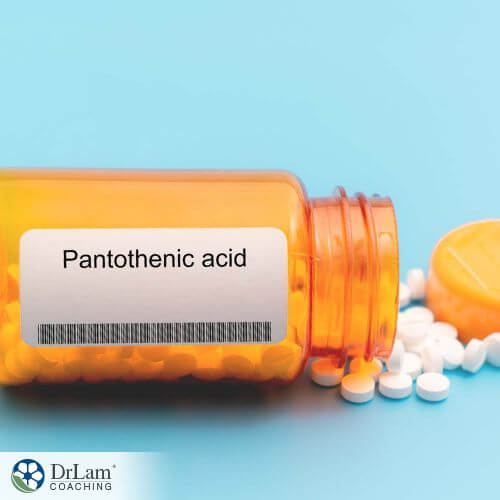 The term "pantos" means "everywhere" in Greek. It is from this term that the name for pantothenic acid, more commonly known as Vitamin B5, is derived.
The term "pantos" means "everywhere" in Greek. It is from this term that the name for pantothenic acid, more commonly known as Vitamin B5, is derived.
Your gut can produce small amounts of this vitamin, although this is not enough to sustain health. This makes it important to ingest sources to reach the recommended intake. If we do not reach the recommended intake, a deficiency can occur.
There are a range of different food sources, including:
The recommended intakes will depend on your age and life stage. These intakes are based on a healthy population and are as follows (1).
If adequate intakes are not achieved, a deficiency in this vitamin can occur. Symptoms of a pantothenic acid deficiency include:
To prevent a deficiency, food sources can be consumed. Alternatively, a supplement can be taken. Pandrenal is one supplement that contains pantothenic acid, pantethine, and amino acids such as arginine and lysine. One capsule of Pandrenal can be taken two to three times a day depending on the recommendations of your healthcare provider or nutritional coach.
When pantothenic acid enters our bodies, it forms a substance called pantethine. Pantethine is a more stable form. It is also more metabolically active. Pantethine is the precursor to an important enzyme called "Co-Enzyme A" (CoA).
CoA plays many important roles in the body including:
Pantethine cannot be obtained by consuming whole foods. Instead, it is either converted from pantothenic acid, or it is consumed in supplemental form. Interestingly, this will lead to the production of CoA, research suggests that pantethine creates twice as much CoA as pantothenic acid. This could be because the structure of pantethine is closer to the CoA production pathway.
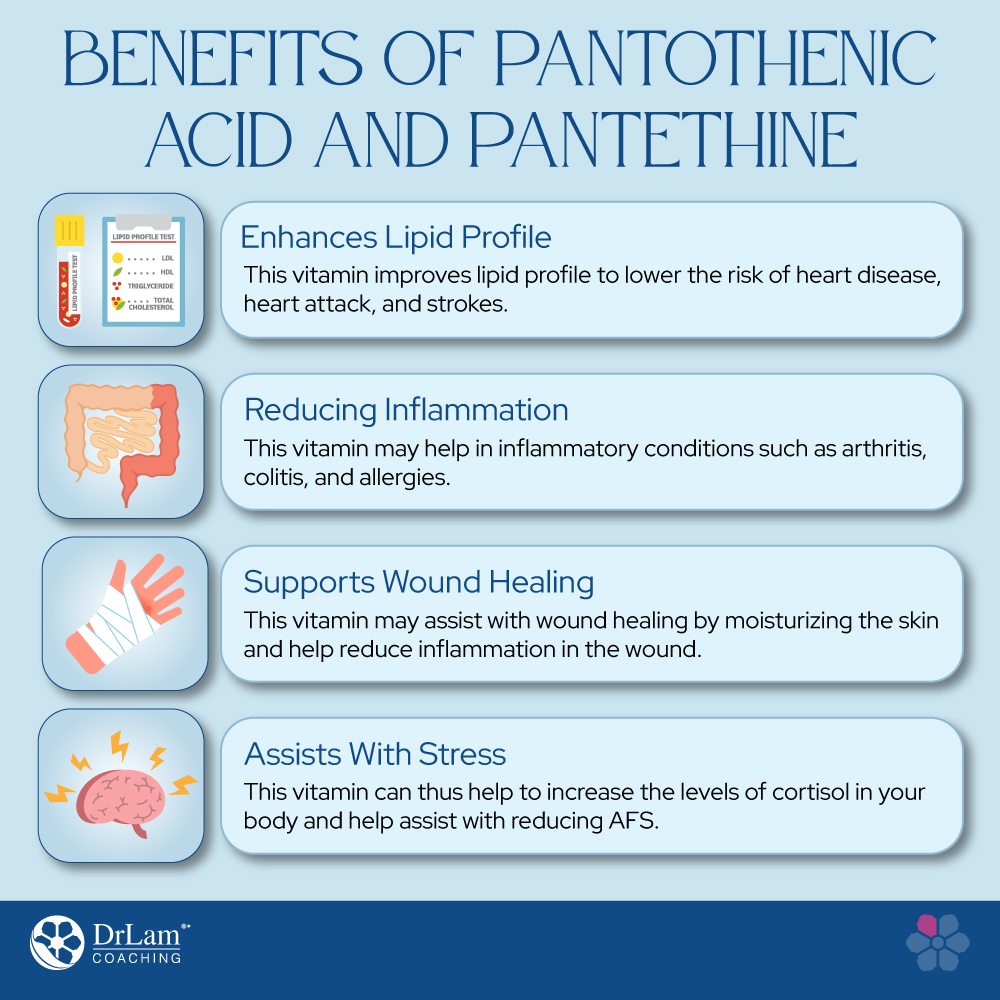
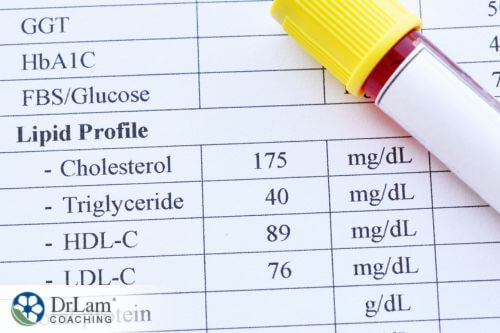 Abnormal lipid profiles affect many individuals and increase the risk of heart disease, heart attacks, and strokes. With the role that pantothenic acid plays in the metabolism of lipoproteins and the synthesis of triglycerides, the recent focus has been on the use of this vitamin in improving lipid profiles.
Abnormal lipid profiles affect many individuals and increase the risk of heart disease, heart attacks, and strokes. With the role that pantothenic acid plays in the metabolism of lipoproteins and the synthesis of triglycerides, the recent focus has been on the use of this vitamin in improving lipid profiles.
Research shows that pantethine is more effective in improving lipid levels. A review conducted in 2005 on the effects of pantethine on lipid levels found that triglyceride levels decreased by 14.2% after one month and decreased by 32.9% after four months. Further studies have been conducted after this review also showing reductions in triglycerides as well as improvements in LDL and HDL cholesterol. However, this effect could also be due to the dietary counseling that participants received (2).
Cortisol not only helps to manage stress but also helps to regulate inflammation in the body. This vitamin helps to reduce inflammation through its antioxidant properties, giving it the potential to neutralize free radicals caused by stress and illness and avoid cellular damage. This may help in inflammatory conditions such as arthritis, colitis, and allergies.
Research suggests that pantothenic acid may assist with wound healing. It is thought to assist by moisturizing the skin. The antioxidant effect may also help reduce inflammation in the wound (3).
Another benefit is the effects it has on your adrenal glands, potentially helping to manage stress. Cortisol is one of the main stress hormones and helps support your body in times of stress. It is needed for the production of cortisol.
In short-term stress, your body produces adequate cortisol to manage stressors. However, when this stress becomes long term it can cause your adrenal glands to become depleted. This results in low levels of cortisol and Adrenal Fatigue Syndrome (AFS). AFS is the non-Addison's form of adrenal dysfunction, where the body's stress response cannot keep up with life's chronic stressors. Pantothenic acid can thus help to increase the levels of cortisol in your body and help assist with reducing AFS.
Additionally, this seems to exert an influence over some indicators of adrenal function. Several animal experiments have shown that a lack of pantothenic acid will affect adrenal cortex function, most likely due to the reduction of adrenal corticosteroids. When pantethine or CoA is injected into animals, there is a marked increase in the functioning of the adrenal glands.
If levels are low, it can reduce the production of cortisol, and this can then lead to AFS. The NeuroEndoMetabolic (NEM) Stress Response System is composed of six related circuits of organ systems that help support your body during stress. A major circuit affected is the Hormone circuit. This circuit consists of the adrenal glands, thyroid gland, and reproductive organs.
Not only can low levels reduce levels of cortisol, but it can also reduce levels of other hormones such as progesterone. This can then result in an imbalance within the reproductive hormones and cause symptoms such as low libido, irregular periods, premenstrual syndrome (PMS), and infertility.
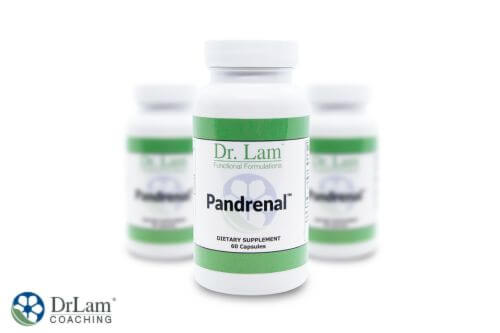 Pandrenal, featuring pantethine, the active form of Pantothenic Acid (Vitamin B5), offers significant support for adrenal health and lipid metabolism. It enhances CoA levels, essential for metabolic processes, and aids in the metabolism of fats and carbohydrates. Pantethine, being a more direct and potent form, also contributes to healthier blood lipid levels, thereby supporting overall health. Additionally, Pandrenal promotes the production of beneficial omega-3 fatty acids and provides natural detoxifying benefits. Its formulation is a safe, natural alternative to synthetic options, making it an effective choice for those seeking a holistic approach to maintaining wellness.
Pandrenal, featuring pantethine, the active form of Pantothenic Acid (Vitamin B5), offers significant support for adrenal health and lipid metabolism. It enhances CoA levels, essential for metabolic processes, and aids in the metabolism of fats and carbohydrates. Pantethine, being a more direct and potent form, also contributes to healthier blood lipid levels, thereby supporting overall health. Additionally, Pandrenal promotes the production of beneficial omega-3 fatty acids and provides natural detoxifying benefits. Its formulation is a safe, natural alternative to synthetic options, making it an effective choice for those seeking a holistic approach to maintaining wellness.
In addition to the standard daily amounts, therapeutic doses may be utilized for various health support purposes. These doses are tailored to specific needs as follows:
Very high doses can cause symptoms such as diarrhea and increase the risk of bleeding. Additionally, it can interact with conventional medications, specifically antibiotics. If you are currently taking antibiotics, check with your healthcare provider before taking pantothenic acid supplements (1).
If you are currently experiencing AFS, it is important to be mindful that paradoxical reactions can occur. This can result in feeling more 'wired' than usual or more anxiety. Additionally, your body can become sensitive to supplements with AFS, so taking a good quality supplement and getting guidance from your healthcare professional is important.
Pantothenic acid is an essential vitamin necessary for optimal health. Some of the roles that it plays within the body include:
Unlock the power of pantothenic acid to enhance your well-being and combat the effects of stress on your body with Dr. Lam's Adrenal Fatigue Nutritional Recovery Program. This comprehensive program incorporates the benefits of essential nutrients like pantothenic acid to support various bodily functions, including improving cholesterol levels, reducing inflammation, and aiding the body's stress response.
Whether you prefer to connect with us directly at +1 (626) 699-8184 or schedule a free initial call by clicking here, our expert team is dedicated to assisting you on your journey to optimal health and well-being.
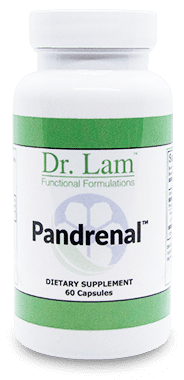
Supporting Your Body In Times Of Stress
Sanvictores, T., and Chauhan, S. "Vitamin B5 (Pantothenic Acid)." StatPearls, June 2023, https://www.ncbi.nlm.nih.gov/books/NBK563233/.
National Institutes of Health. "Pantothenic Acid." Office of Dietary Supplements, Mar. 2021, https://ods.od.nih.gov/factsheets/PantothenicAcid-HealthProfessional/.
Gheita, A. A., and Gheita, T. A. "The Potential Role of B5: A Stitch in Time and Switch in Cytokine." Phytotherapy Research, vol. 34, no. 2, Feb. 2020, https://onlinelibrary.wiley.com/doi/abs/10.1002/ptr.6537.
Whilst pantethine can produce more CoA and has been shown to have benefits in reducing lipid levels, pantothenic acid does provide benefits. Choosing a supplement that contains both pantothenic acid and pantethine may be the best way to reap the benefits of both.